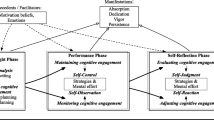Abstract
The comment starts with a review of the authors’ four phase model of SRL as metacognitive, motivated, and strategic where it is suggested to complete the model with aspects of motivation, emotion, and attribution. Furthermore, integrating theories about “online motivation” within the model’s internal regulatory part and framing it with elements of interest theory could increase the explanatory power in view of the dynamics in the regulatory component. The authors’ critics of methodological shortcomings and their preference of “in vivo” indicators about learners’ tactics is acknowledged although their meaning of “validity” needs further elaboration, especially with regard to a precise definition of adequate parameters that depict significant characteristics of traces and of time-related changes. With respect to the Learning Kit Project, a parallel on-line measure of concurrent motivational and emotional states is suggested as well as an emphasis on regulatory aspects having their source in dynamic interactions between cognition, motivation, and emotion. Regarding the accompanying software, considering the difference in perspectives, roles, and needs of teachers and researchers and to integrate project and software into a more explicit instructional concept could help to realize its promising and challenging target even more efficiently.
Similar content being viewed by others
References
Boekaerts, M. (1996). Self-regulated learning at the junction of cognition and motivation. European Psychologist, 1(2), 100–112.
Boekaerts, M., & Corno, L. (2005). Self-regulation in the classroom, In M. Boekaerts, S. Maes, & P. Karoly (Eds.), Self-regulation across domains. Special Issue of Applied Psychology: An International Review.
Corno, L., & Mandinach, E. B. (1983). The role of cognitive engagement in classroom learning and motivation. Educational Psychologist, 18, 88–108.
Krapp, A. (1999). Interest, motivation and learning: An educational–psychological perspective. European Journal of Psychology of Educatíon, 14, 23–40.
Kuhl, J. (1992). A theory of self-regulation: Action versus state orientation, self-discrimination, and some applications. Applied Psychology: An International Review, 41, 95–173.
Nenniger, P. (1999). On the role of motivation in self-directed learning. The ‘Two-Shells-Model of motivated self-directed learning’ as a structural explanatory concept. European Journal of Psychology of Education, 14(1), 71–86.
Pekrun, R. (2000). A social cognitive, control-value theory of achievement emotions. In J. Heckhausen (Ed.), Motivational psychology of human development. Oxford, UK: Elsevier.
Schiefele, U. (2001). The role of interest in motivation and learning. In J. M. Collis & S. Messick (Eds.), Intelligence and personality: Bridging the gap in theory and measurement (pp. 163–194). Mahwah, New Jersey: Erlbaum.
Sembill, D., Wolf, K., Wuttke, E., & Schumacher, L. (2003). Self-organized learning in vocational education—Foundation, implementation, and evaluation. In K. Beck (Ed.), Teaching-learning processes in vocational education (pp. 267–295). Berlin: Lang.
Weiner, B. (1986). An attributional theory of motivation and emotion. Berlin Heidelberg New York: Springer.
Weiner, B. (2000). Intrapersonal and interpersonal theories of motivation from an attributional perspective. Educational Psychology Review, 12, 1–14.
Winne, P. H., Hadwin, A. F., Nesbit, J. C., Kumar, V., & Beaudoin, L. (2005). gSTUDY: A toolkit for developing computer-supported tutorials and researching learning strategies and instruction (version 2.0) [computer program]. Burnaby, British Columbia: Simon Fraser University.
Author information
Authors and Affiliations
Corresponding author
Rights and permissions
About this article
Cite this article
Nenniger, P. Comment on Perry & Winne’s “Learning from Learning Kits: gStudy Traces of Students’ Self-Regulated Engagements with Computerized Content”. Educ Psychol Rev 18, 233–237 (2006). https://doi.org/10.1007/s10648-006-9015-2
Published:
Issue Date:
DOI: https://doi.org/10.1007/s10648-006-9015-2




